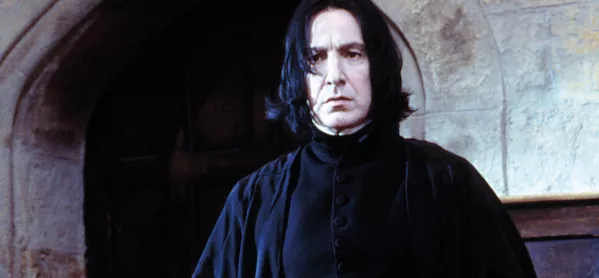- Home
- Do the movies give teaching a bad reputation?
Do the movies give teaching a bad reputation?

What can cinema teach us about teaching? Hollywood has never been much help: it either shows the profession to be a breeze with plentiful downtime - as with Cameron Diaz in Bad Teacher and Jack Black in School of Rock - or dangerous or demoralising but ripe for the courageous non-conformist: think Michelle Pfeiffer winning over the gang-warring kids in Dangerous Minds.
Such representations marginalise the mechanics of “real” teaching in favour of broad-stroke displays of how its inspirational practitioners remain children at heart and/or refuse the creativity-stifling system.
But what of British cinema? Does it eschew the exaggerations of Hollywood for a more realistic portrayal of teaching that acts as a champion for getting people into the job?
For my latest book, The British School Film, I researched about 100 films that include secondary education in the UK to analyse just how British cinema has projected our profession. Perhaps unsurprisingly, class, in all its meanings, is central to the British portrayal. For the first half of the 20th century, one might conclude that only fee-paying schools existed, as the privately educated film-industry elite focused on their alma maters to instil a code of national leadership and service: Alfred Hitchcock’s silent rebuke to their isolated, all-male unworldliness in 1927’s Downhill being overridden in the public imagination by 1939’s paean to character building and the social status quo, Goodbye, Mr Chips.
It took the Second World War and its resultant societal reforms to shift matters. Firstly, public schools were re-examined with a more persistently critical slant - seek out Mr Perrin and Mr Traill - and the whole edifice was eventually gunned down in Lindsay Anderson’s superb 1968 film If….
The whole ideology was only glaringly exposed in Ken Loach’s 1969 masterpiece, Kes
Secondly, the educational experience of the majority was finally brought to the screen, though even supposedly hard-hitting 1960s secondary modern films such as Term of Trial and To Sir, with Love crucially failed to indict an unfair, underfunded state system. The whole ideology was only glaringly exposed in Ken Loach’s 1969 masterpiece, Kes.
The problem with these belated state school films was again to focus not on systems themselves, but system-bucking, inspirational teachers, notably Sidney Poitier’s Guyanese immigrant Mark Thackeray from the enduringly popular 1967 movie To Sir, with Love - an educator who transforms his inner-city charges with their hereditary sins of bad grammar and poor personal hygiene into decent and compliant members of society.
An opposite post-war teacher type, more damaging to the profession’s sense of self-worth, is the desiccated lifer - those bullying and belittling teachers who fail to learn how to inspire, and instead retreat into intimidation and self-loathing, notably Andrew Crocker-Harris from The Browning Version and even, arguably, Harry Potter’s Severus Snape.
Like America, Britain has had a roll call of comic incompetents, eccentric, unqualified or both - from Will Hay’s 1935 headmaster in Boys Will Be Boys through to Jack Whitehall’s recent embodiment of a Bad Education. Yes, there are (at times) carnivalesque laughs, but this pervasive light touch surely undermines the profession just as much as intermittent portrayals of hard-handed sadists.
‘Dangerous and unwholesome’
This last type is the dangerous romantic, charismatic loose cannon that goes too far with impressionable minds: long before Robin Williams in Dead Poets Society or Dennis Gansel’s The Wave, Maggie Smith elegantly educated the crème de la crème in 1969’s The Prime of Miss Jean Brodie. The film exposes Brodie as a genuinely “dangerous and unwholesome” influence on the young girls she claims are her vocation, her cult of personality culminating in exploitation, totalitarianism, even death.
Of course, Brodie is a rarity in this British listing: though most teachers in the UK education system have long been female, you would not know so from watching British school films. Largely absent from our screens, like state education itself, until the mid-1950s, female teachers have thereafter been represented as troubling custodians of authority, from female impersonations, such as Alastair Sim’s headmistress Miss Fritton in The Belles of St Trinian’s, through to Hattie Jacques’ cane-wielding deputy Miss Short in Carry On Teacher and Imelda Staunton’s pink-knit party apparatchik Dolores Umbridge in Harry Potter and the Order of the Phoenix.
Female teachers have been, at best, sexualised figures
Female teachers have been, at best, sexualised figures defined not by classroom talent but by romantic relationships with male colleagues - as when Ruth Gemmill breaches Colin Firth’s Arsenal-tight defences in Fever Pitch.
So what can we take from the depiction of teachers on the big screen? Where television series have time to explore the motivations of teaching and to approximate its daily rhythms, cinema is a short, simplifying medium that has projected a coarsened, essentially corrosive view of real teaching. If the profession is looking for help with its public image, it should not look to British film.
Stephen Glynn is head of languages at Oakham School, Rutland. His new book, The British School Film: from Tom Brown to Harry Potter, is published by Palgrave Macmillan
Keep reading for just £1 per month
You've reached your limit of free articles this month. Subscribe for £1 per month for three months and get:
- Unlimited access to all Tes magazine content
- Exclusive subscriber-only stories
- Award-winning email newsletters